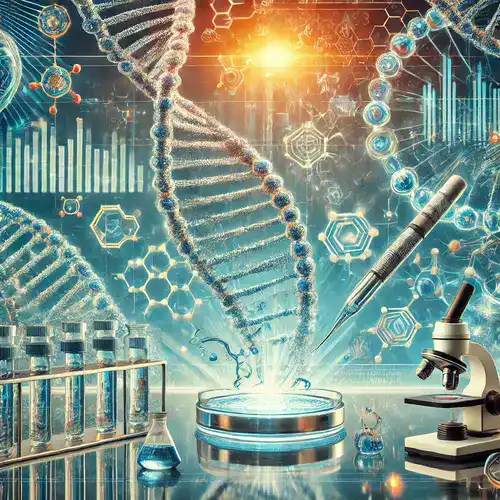CRISPR therapy, or CRISPR-Cas9 gene editing, is revolutionizing modern medicine by providing a tool to alter DNA with unprecedented precision. As groundbreaking as it is, this technology comes with both remarkable potential and significant concerns. In this article, we’ll explore the pros and cons of CRISPR therapy, including real-life examples and expert opinions.
Pros of CRISPR Therapy
- Treatment for Genetic Disorders One of the biggest promises of CRISPR therapy is its ability to correct genetic mutations that cause inherited diseases. Conditions such as sickle cell anemia and cystic fibrosis, which currently have no cures, could potentially be treated by altering the defective genes directly.
- Case Example: Maria, a 34-year-old with sickle cell anemia, participated in a CRISPR trial that targeted the specific mutation responsible for her condition. After treatment, Maria’s symptoms improved significantly, offering hope for a long-term solution.
- Quote:
“CRISPR-Cas9 technology offers an unprecedented opportunity to correct mutations at the DNA level, providing potential cures for diseases once deemed untreatable,” notes Dr. Jennifer Doudna, co-inventor of CRISPR, in an article for Nature Biotechnology.
- Potential for Cancer Treatment CRISPR therapy can also be applied in cancer immunotherapy, where scientists modify immune cells to recognize and attack cancer. This approach could offer a personalized treatment for various cancers.
- Case Example: David, diagnosed with advanced lung cancer, received CRISPR-modified T-cells designed to attack the cancerous cells. After six months of treatment, his tumor size had reduced, suggesting promising results for the future of cancer treatment.
- Quote:
“Using CRISPR to engineer T-cells to target specific cancer markers has shown great promise in initial trials, particularly in patients with resistant cancers,” reports The New England Journal of Medicine.
- Accelerated Drug Development CRISPR enables researchers to rapidly develop new therapies by directly manipulating genes in laboratory settings. This allows for faster drug discovery compared to traditional methods, potentially bringing treatments to market sooner.
- Quote:
“The ability of CRISPR to facilitate gene modifications expedites the development of novel therapies, offering faster avenues to clinical applications,” states a study in The Lancet.
- Quote:
Cons of CRISPR Therapy
- Unintended Genetic Changes (Off-Target Effects) While CRISPR is precise, it is not perfect. Off-target effects can occur when the Cas9 enzyme cuts unintended sections of the genome, potentially leading to unforeseen complications or health risks.
- Case Example: In a clinical trial, Emily, treated for a rare genetic disorder, experienced unexpected immune reactions due to unintended genetic alterations. This highlights the need for ongoing safety evaluations.
- Quote:
“The risk of off-target effects remains a concern, particularly as we move CRISPR into clinical settings. Ensuring the safety of gene editing is paramount,” writes Dr. Kiran Musunuru in The Journal of Clinical Investigation.
- Ethical Concerns One of the most debated aspects of CRISPR is its ethical implications. Editing human embryos or making heritable changes that can be passed to future generations raises questions about “designer babies” and long-term societal impacts.
- Quote:
“The potential misuse of CRISPR technology for non-therapeutic purposes, such as enhancing traits in humans, is a critical ethical issue that must be addressed,” asserts The American Journal of Bioethics.
- Quote:
- Unknown Long-Term Effects As CRISPR is a relatively new technology, the long-term effects of gene editing are still unknown. There are concerns that editing DNA could inadvertently increase the risk of other diseases, such as cancer, in the future.
- Quote:
“While CRISPR offers immediate benefits, the long-term implications remain uncertain, particularly regarding unintended genetic changes,” concludes a study published in Cell.
- Quote:
- Cost and Accessibility Currently, CRISPR treatments are extremely expensive, limiting their accessibility. As the technology advances, costs may decrease, but at present, only a few can afford these cutting-edge therapies.
Table: Key Pros and Cons of CRISPR Therapy
| Pros | Cons |
|---|---|
| Treatment for genetic disorders | Risk of off-target effects |
| Potential for cancer treatment | Ethical concerns (e.g., designer babies) |
| Accelerated drug development | Unknown long-term effects |
| Agricultural and environmental benefits | High cost and limited accessibility |
Outcome Story: CRISPR in Action
In a remarkable study, a research team used CRISPR to treat Jack, a patient with muscular dystrophy. The therapy specifically targeted the gene responsible for the condition, and over time, Jack experienced noticeable improvements in muscle strength and mobility. His case highlights the potential for CRISPR to treat complex genetic diseases.
Balancing Hope and Risks
CRISPR therapy holds immense potential to transform the treatment of genetic diseases, cancers, and other health conditions. However, as with any groundbreaking technology, there are risks and ethical dilemmas that must be weighed carefully. As researchers continue to explore this field, it’s crucial to consider the pros and cons of CRISPR therapy, ensuring that its application is both safe and ethical.
About the Author
Reyus Mammadli is the author of this health blog since 2008. With a background in medical and biotechnical devices, he has over 15 years of experience working with medical literature and expert guidelines from WHO, CDC, Mayo Clinic, and others. His goal is to present clear, accurate health information for everyday readers — not as a substitute for medical advice.







